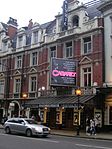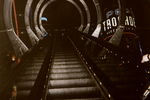Apollo Theatre
Art Nouveau architecture in LondonArt Nouveau theatresBuilding collapses in the United KingdomCollapsed buildings and structuresDisasters in London ... and 6 more
Grade II listed buildings in the City of WestminsterRenaissance Revival architecture in the United KingdomTheatres completed in 1901Theatres in the City of WestminsterUse British English from July 2014West End theatres

The Apollo Theatre is a Grade II listed West End theatre, on Shaftesbury Avenue in the City of Westminster, in central London. Designed by the architect Lewin Sharp for owner Henry Lowenfeld, it became the fourth legitimate theatre to be constructed on the street when it opened its doors on 21 February 1901, with the American musical comedy The Belle of Bohemia.
Excerpt from the Wikipedia article Apollo Theatre (License: CC BY-SA 3.0, Authors, Images).Apollo Theatre
Hinter der Mauer, Rostock Stadtmitte (Ortsbeirat 14 : Stadtmitte)
Geographical coordinates (GPS) Address Nearby Places Show on map
Geographical coordinates (GPS)
| Latitude | Longitude |
|---|---|
| N 51.511472 ° | E -0.133417 ° |
Address
Kuhtor
Hinter der Mauer 2
18055 Rostock, Stadtmitte (Ortsbeirat 14 : Stadtmitte)
Mecklenburg-Vorpommern, Deutschland
Open on Google Maps









